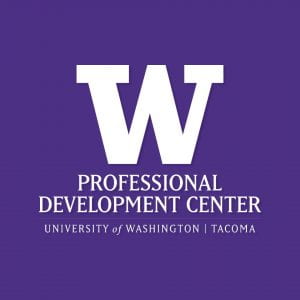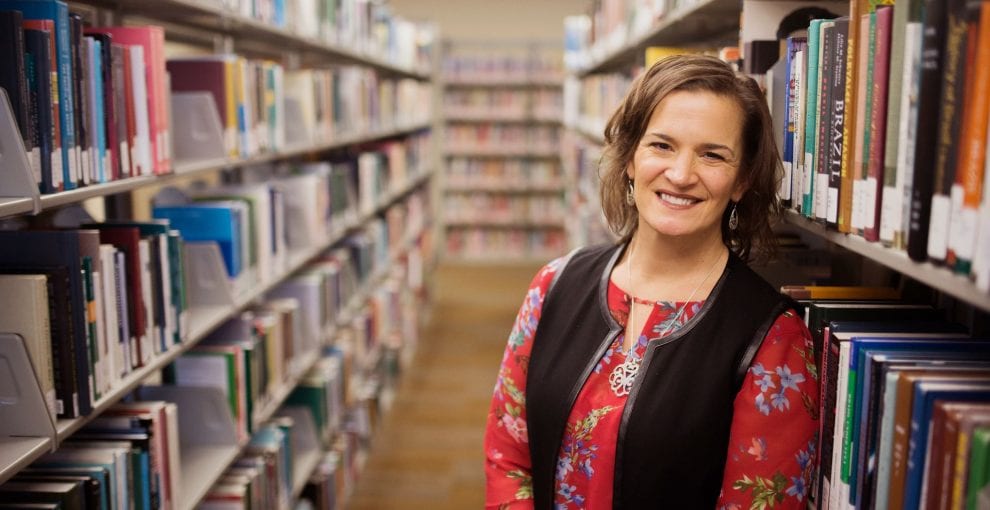[Meet the Instructors is a series intended to introduce you to one of the greatest resources the University of Washington Tacoma Professional Development Center has to offer: its diverse team of veteran, industry-tested professionals. The Center’s professional development programs are designed to be rewarding, challenging and cutting-edge. Our instructors play no small part in that, ensuring students are exposed to the most current industry trends while remaining well-versed in the tried-and-true best practices of their professions. We’re excited to share our instructors with you, and their stories are a great place to start.]
Dr. Wendy Fraser is no stranger to the UW Tacoma Professional Development Center. We know her type well.
Fraser is what you call a lifelong learner. Like many PDC students, she has a passion for learning and sees the value of pursuing new educational experiences. Graduating from Saint Martin’s University with a Bachelor’s in Management and Finance, Fraser was only getting started on her journey through higher education. Since 1991, she has gone on to earn Master’s degrees in human resources, organizational leadership and human and organizational systems. She completed her Doctorate in Human and Organizational Development from Fielding Graduate University in 2010.
Fraser has furthermore completed Lean Six Sigma Green and Black Belt certifications at UW Tacoma, as well as numerous other professional certifications. After all that time as a student, it turns out the other side of the classroom is where she has learned the most. Fraser has held a variety of faculty teaching positions and is currently an instructor in the PDC’s Lean Six Sigma: Black Belt and Certified Public Manager® programs.
“I love it,” said Fraser. “Going to school and learning truly is lifelong.”
She particularly loves teaching in the continuing education environment. Well, maybe not teaching, exactly.
“I don’t like to use the word teach. I like being a facilitator of learning,” said Fraser. “You have to make the space so that students can bring their best selves to the learning environment. If you come in there with the mindset of a traditional teacher, students might feel like they have to take notes and listen to everything you say so they can regurgitate it in a paper.
“I love to create learning labs, where everybody brings wisdom and it’s not just me bestowing something upon students.”
Many PDC students similarly enjoy the norm of their classmates contributing to the learning environment. Unlike traditional college students, they often have years or even decades of life and professional experiences to bring to the subject material.
“I love when students want to be there,” said Fraser. “That’s one thing that I love about a professional development experience, is typically people want to be there.”
In between, during and after her time in school, Fraser has worked extensively in the public sector.
“I started working at Department of Ecology as a sophomore in college,” said Fraser. “I worked in budget office for six years.”
Fraser eventually moved on from budget analysis to manage employee development and training. She would later move on to Department of Revenue, where she served as the Organization Development Director for eight years.
She has often used Lean Six Sigma and process improvement in general, to help her work.
“Anyone who facilitates or supervises the work of others, because they have influence over the work, all of those people need to understand how processes and systems work. At a minimum, you should know that,” she said.
While Lean Six Sigma originated in manufacturing, it is highly useful for most types of private and public organizations. It can be especially useful for governments, Fraser said.
“If government does the job well using continuous improvement tools and mindsets, then there are value-filled interactions with citizens seeking services,” she said.
Beyond Lean Six Sigma, it’s her work with organizational relationships and trust that has most shaped where Fraser is today.
This year, Fraser will publish a book, Trust Repair: It Is Possible, which provides insight to the ten years of research and practice she has gained working as a consultant in the field of organizational trust repair.
“As a consultant, people hire me when the team is struggling because relationships are severed or fragmented,” said Fraser. “If people stop working together, that’s going to affect how we get our work done, how we communicate and how we make decisions.”
“Trust issues affect you personally and that also shows up in groups. Organizations experience low morale, productivity takes a toll, and it can show up in HR and legal risk if there’s unresolved tension,” she said.
Trust Repair began with Fraser’s dissertation research and has evolved after years of practice. She began with asking the question:
“What sets groups that can repair trust apart from those that can’t?”
“In my research, I’ve found that there’s a pattern. There’s a pattern in trust repair, but there’s also a pattern around the behaviors that support healthy trust,” said Fraser. “The inverse of that is patterns that can erode trust.”
“It’s a book you can use as self-help,” she said. “I’m an optimist and I believe in the human spirit. I believe people can change and make things better. This book is here to support people with practical advice, tools and models.”
Making a connection to the rest of Fraser’s career, you might describe her work in trust repair as “continuous improvement in relationships.” Much like Lean Six Sigma, trust repair requires critical thinking, thorough data and careful analysis.
“Relationships go sideways because people are not getting good data,” said Fraser.
“Doing trust work, there’s not one model,” she said. “That’s one of the biggest problems is when people think that a motivational speaker or a one day teambuilding exercise is going to fix things. [In terms of Lean Six Sigma,] it’s like going straight to the improve phase without understanding the data, analyzing the process and what’s really going on.”
Fraser’s book is in the final stages of publication and will be released soon. She will be sharing the practical application of her research this fall in a UW Tacoma PDC course titled: Getting Unstuck: Strategies to Repair Trust Within Your Organization.
In the meantime, students can learn directly from her in a Lean Six Sigma or Certified Public Manager® course. She also left us with a parting piece of advice for prospective students:
“Learners today, the more credentials or experiences you give yourself – it makes you a stronger candidate to have these in your story,” said Fraser. “Beyond the obvious value of being more marketable, I love knowing I can draw on a variety of resources that I’ve learned through education.”
Visit our website to learn more about Lean Six Sigma and Certified Public Manager®.

